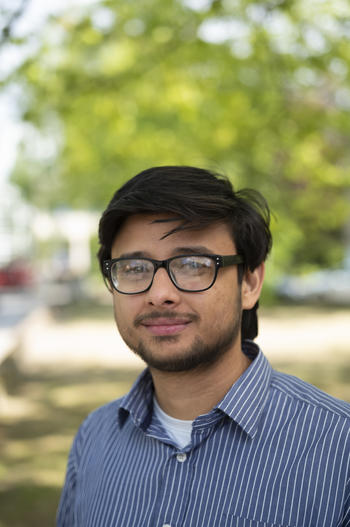Luis Kliche

International Research Training Group 'Temporalities of Future in Latin America'
Political Science
PhD Project: "State, memory, and public campaigns. Youth mobilization dynamics in neosandinista Nicaragua"
Education
|
05/2019 – 10/2022 |
PhD Candidate, International Research Training Group ‘Temporalities of Future’ |
|
10/2014 – 07/2018 |
Master of Arts in Interdisciplinary Latin American Studies, Freie Universität Berlin |
|
10/2015 – 02/2016 |
Graduate Program (Programa Profesional Avanzado) in Memory, Postmemory and Youth Cultures, Universidad Centroamericana, Managua |
|
10/2009 – 09/2013 |
Bachelor of Arts in Political Science and Public Administration, Universität Potsdam |
Work Experience
|
Since 11/2022 |
Research Fellow and Lecturer in Latin American Politics, Institute for Latin American Studies, Freie Universität Berlin |
|
05/2019 – 10/2022 |
Researcher, International Research Training Group ‘Temporalities of Future’ |
|
Since 03/2014 |
Coordination of Scholarship Program for University Students, Puente Nica e.V. |
|
05/2015 – 12/2017 |
Student Research Assistant, Project: "Police Building and transnational security fields in Latin America", Faculty of Social Sciences, Freie Universität Berlin |
|
09/2015 – 01/2016 |
Research Internship, Universidad Centroamericana, Managua |
PhD Project: "State, memory, and public campaigns. Youth mobilization dynamics in neosandinista Nicaragua"
Supervisor: Prof. Dr. Marianne Braig, Freie Universität Berlin
This research examines the statecentric construction of young political subjects in 21st century “neosandinista” Nicaragua, in a state administration which has been both rhetorically anti-neoliberal, and politically and economically pragmatic and well adjusted to market logics. In recent years, the bulk of academic work from social sciences regarding youth in Latin America has focused on sociocentric or "informal" expressions of public participation that encompass cultural collectives, social movements and artistic statements which are not directly linked with state initiatives. This approach is apprehensible as it is temporally framed in a general scenario of state retreat driven by the implementation of a neoliberal paradigm since the 1990s. On the other hand, few assessments have centered on the efforts carried by states to mobilize young activists in the neoliberal era. In these cases, state and government institutions attempt to form young political participants inside a role assign to them by a hegemony erecting project. Framed in a Laclauian perspective, the thesis aims at defining the articulations of identification, inclusion and participation arising in said construction, while highlighting the tensions and entanglements that youth have in relation with state structures and different projections of current and future collective endeavors as present and past ideas of future-building clash with the reality of the contradictions between discourse and political action.
Articles
Caruso, Marcelo and Kliche, Luis (2024). "Tu pasado es mi futuro. La vía al socialismo, la política escolar y las relaciones Nicaragua-Cuba-República Democrática Alemana (1979–1985)", Temporalidades del futuro. Lo colonial, lo posible y lo político, Vol. 2, Hausberger, Bernd, Ricardo Pérez Montfort, Stefan Rinke and Claudia Carolina Zamorano Villarreal (eds.), Mexico: El Colegio de México, 197–224.
Caruso, Marcelo and Kliche, Luis. (2023). Mythos der Etappe: Der Weg zum Sozialismus, Schulpolitik und die Nicaragua-Kuba-DDR-Beziehungen (1979-1985). Zeitschrift für Pädagogik Beiheft (1), 163-181.
Kliche Navas, Luis (2022). La prosa de la contra-insurgencia: "lo político" durante la restauración neoliberal en Nicaragua, de Ileana Rodríguez. Mitologías Hoy (25), 178-181. https://doi.org/10.5565/rev/mitologias.819
De Aquino, Elis and Kliche, Luis. (2021). “Nobody has the answer, but we need some map, even to go into the unknown”: A Conversation with Arjun Appadurai on Research, Speculation and Future Thinking. Critical Reviews on Latin American Research, 9(1), 18–26. https://www.crolar.org/index.php/crolar/article/view/382
Kliche Navas, Luis (2016). "Aquí están los cachorros de Sandino". La presencia virtual de desmovilizados del Servicio Militar Patriótico en Facebook. Revista de Historia, (33-34), 131-140.
MA Thesis
Kliche Navas, Luis (2018). Policía comunitaria y politización en Nicaragua. Las transformaciones del modelo comunitario desde el regreso del Frente Sandinista (2007-2016). Berlin: Freie Universität Berlin. http://dx.doi.org/10.17169/refubium-4069
Translation
Daum, Timo (2018). El capital somos nosotros. Crítica a la economía digital, translated by Luis Kliche Navas. San José: Uruk Editores.


